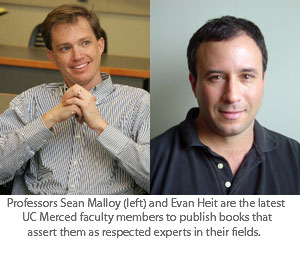

HistoryProfessor
Sean Malloyis the newest faculty member in the
School of Social Sciences, Humanities and Artsto publish his own book.
Atomic Tragedy: Henry L. Stimson and the Decision to Use the Bomb against Japan,provides a unique perspective on Stimson’s involvement in the nuclear weapons program during World War II.
Stimson, who served as secretary of war during WWII, oversaw the American nuclear weapons program. According to the publisher’s Web site, … Malloy examines Stimson’s struggle to reconcile his responsibility for the most terrible weapon ever known in human history’ with his long-standing convictions about war and morality.
Stimson didn’t believe civilians should be military targets, Malloy said during a recent interview in his UC Merced office, adding that the evidence he uncovered about Stimson’s moral beliefs further highlight the agony of his decision.
For Malloy, publishing Atomic Tragedy is the culmination of years of research begun while working on his
doctorateat Stanford University in Palo Alto. But the founding
facultymember doesn’t plan to stop here. He’s working on a historiographical study of U.S. strategic bombing in WWII and also plans to write an intellectual history of the New Left and the American foreign policy tradition.
In publishing Atomic Tragedy, Malloy has joined a select group of SSHA professors who’ve had books hit the presses since arriving at UC Merced.
Among that group is
Evan Heit, a
cognitive scienceprofessor who published Inductive Reasoning: Experimental, Developmental, and Computational Approaches last fall through Cambridge University Press.
Inductive
reasoningis the science of guesstimation,’ Heit explained recently and says the sun rising and setting is a perfect example of that science. Predicting that the sun will rise tomorrow - because that’s what it’s done every morning since time began - is just an educated guess. And that’s what inductive reasoning is all about.
Heit’s book, co-written by Durham University’s Aidan Feeney, is the first in 20 years to examine the psychology of inductive reasoning and is the compilation of a series of presentations from the 2004 International Conference on Thinking in Belgium.






